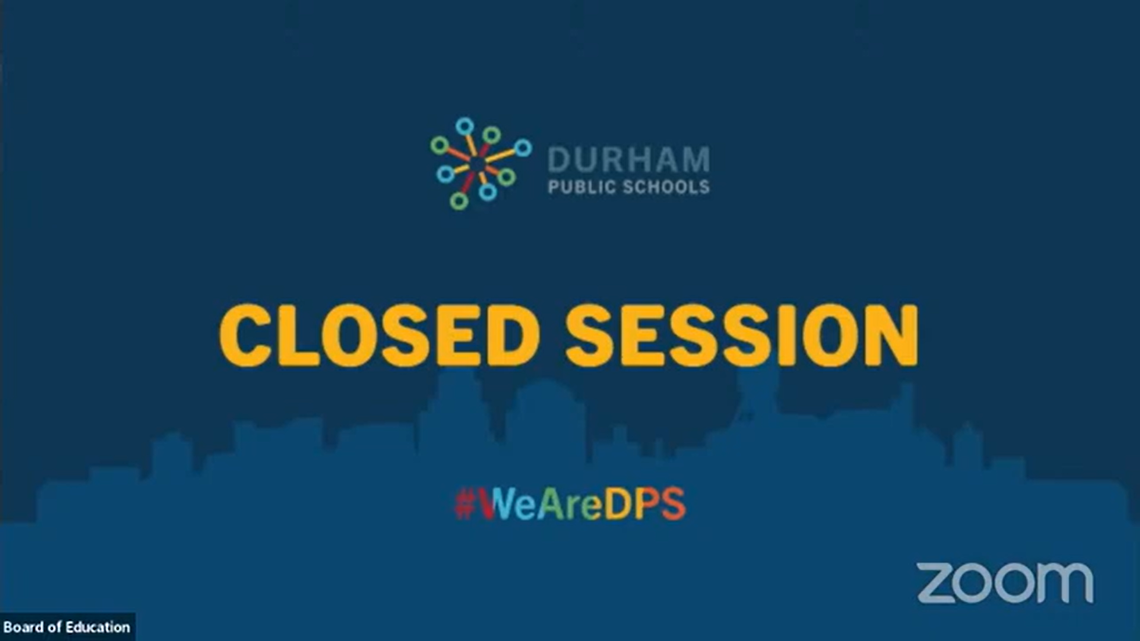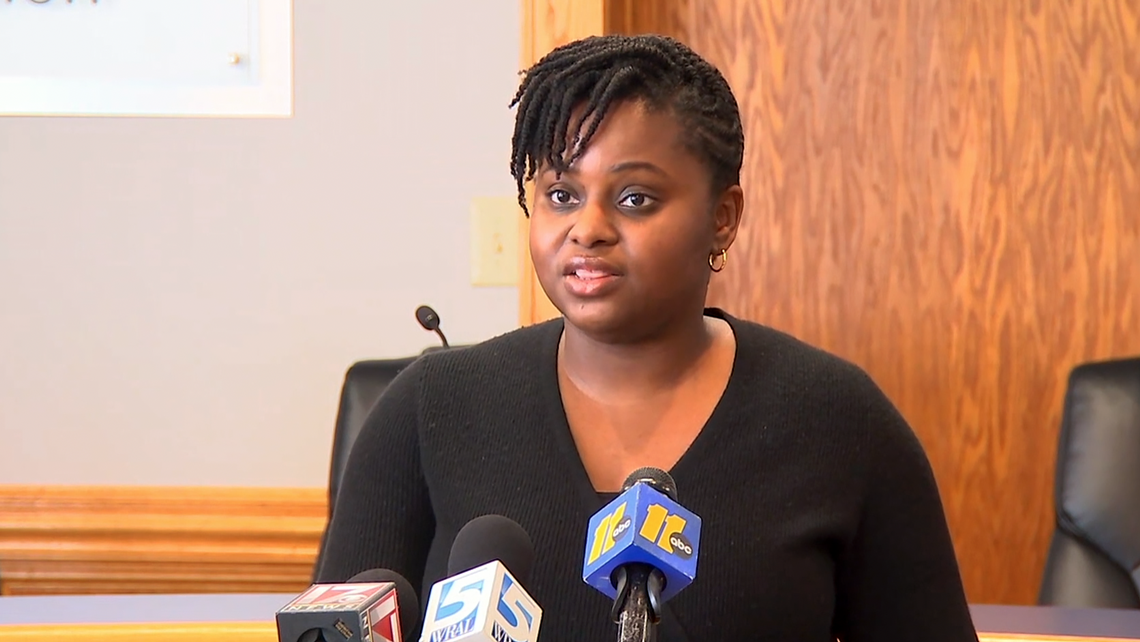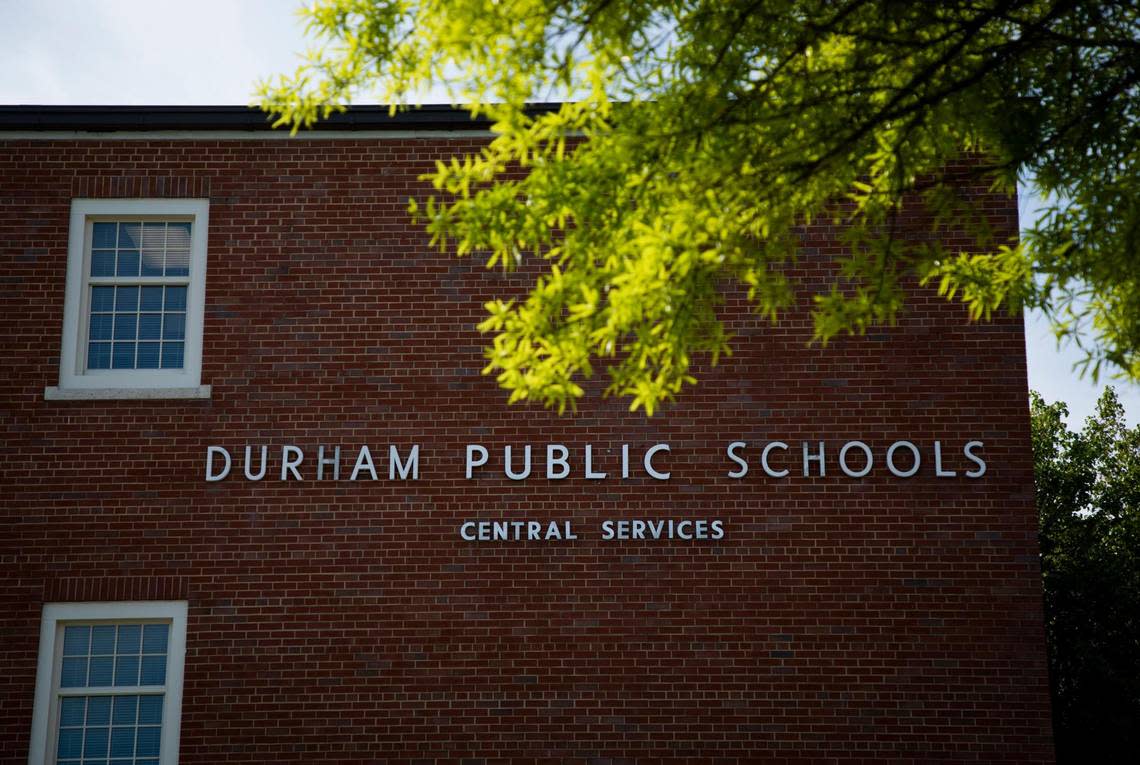Did Durham Board of Education break law with closed session meeting? Expert says yes
When school board members met Monday morning to discuss pay issues that have roiled Durham Public Schools this month, they did so in private.
That’s allowed under North Carolina law, but an expert says the way they went about the private meeting violated the state’s open meetings statute.
The board voted to go into and out of the closed session outside of the public view.
“That’s a violation of law,” said Brooks Fuller, director of the N.C. Open Government Coalition.
The “relatively minor procedural requirement” to gavel in and out of a closed-door session in an open meeting is an important safeguard, Fuller told The News & Observer.
“That is one of the ways that you establish and maintain trust between the public and the public body,” Fuller said. “To show that they’re doing everything by the book, by the procedure; not taking any shortcuts or doing anything nefarious. That is one of the ways you prove that to the people.”
Board of Education Chair Bettina Umstead told The N&O that the board did start and end the meeting in open session, but that it remained in the same conference room — where media and the public were not allowed — as the meeting transitioned between open and closed.
Umstead said because they opened the room’s doors, it qualified as open session.
However, staff members in the hallway waited about 25 minutes to tell a sequestered roomful of reporters the meeting had ended, saying at the time that they didn’t know whether the meeting was over because they too weren’t permitted inside.
A district spokesperson said she discussed The N&O’s questions with the board’s attorney, Rod Malone.
“Mr. Malone acknowledges that the press should have been invited into the conference room for the adjournment,” the spokesperson said in an email Wednesday. “He said he will make sure this happens if the Board meets solely in the conference room in the future.“

Raises produced ‘accounting error’
The board, in a public notice posted to the district’s website Friday, said it was meeting Monday to review a salary overpayment issue in a closed session “to discuss attorney-client privilege and personnel matters.”
But the statute says “general policy matters may not be discussed in a closed session and nothing herein shall be construed to permit a public body to close a meeting that otherwise would be open merely because an attorney employed or retained by the public body is a participant.”
When asked about this Wednesday, Umstead said she would reply in writing, but had not done so as of 6 p.m.
It’s not yet clear precisely what the board discussed during the meeting, but the issues involved the failed rollout of raises to about 1,300 classified staff members, including bus mechanics and cafeteria workers:
An open question: There is no official word yet on what will become of the raises. Certain staffers were told in January their raises would be lower than promised in 2023, in some cases by hundreds of dollars a month. The district said earlier this month an “accounting error” had occurred and they are investigating the cause.
What Umstead said: In a statement Monday, she said board members “have asked the administration to identify sufficient funds” to let teachers keep all the pay they received and to let the so-called overpayments continue into January.
Closing a previously public discussion: The board approved significant raises last year and began doling them out in October. They previously discussed the new salaries — and how to budget for them — in public meetings throughout 2023. Salary schedules vary according to experience and are matters of public record.
The next meetings: Another closed session meeting will be held at 5 p.m. Thursday in a different location. A regularly scheduled public meeting will follow at 6:30 p.m.
Reporters sequestered in room with smooth jazz
How it played out:
8 a.m.: The Board of Education gathered in a private board room on the third floor of their downtown administrative building. A public notice promised a statement would follow the meeting, which was scheduled to last until 10 a.m.
Around 8:15 a.m.: The first reporter, from The News & Observer, arrived. A staffer asked her to leave the hallway and enter a small office, which other staff attempted to close several minutes later.
Around 9 a.m.: More reporters arrived. Staff directed them and the first reporter into the board room, where public meetings typically occur, for the rest of the morning. They put on a smooth jazz video to cover any stray noise and repeatedly asked people to stay out of the hallway, though the door was left open.
10:56 a.m.: The meeting ended. Some board members appeared in the hallway and left the building. Reporters got ready for the expected statement.
Several minutes later: Staff told reporters the statement would instead come at 2 p.m. A reporter asked if the meeting was still going on. Staff said they didn’t know because it was a closed session and they weren’t allowed inside.
Around 11:20 a.m.: Staff confirmed the meeting had ended and provided the time it ended.
Noon: Superintendent Pascal Mubenga met with transportation workers for an hour and a half. Media were not allowed inside the meeting, but were permitted in the hallway.
1:13 p.m.: Notice went out for another closed session school board meeting, to be held later this week.
Around 1:45 p.m.: Reporters were directed back into the board room, where the statement would be made, to set up their equipment.
2:30 p.m.: Umstead gave a statement and left without taking questions.

What the law says
North Carolina’s public meetings statute lays out the rules for conducting public meetings.
It allows certain meetings to be closed to the public, but only under limited circumstances.
When the school board goes into closed session, it typically convenes in the board room before and after, and streams online throughout, displaying a simple “Closed Session” placard on the screen when the board is in its private chamber. That did not happen Monday.
A motion to close a public meeting must cite the applicable “permissible purposes.” The law offers 10.
Attorney-client privilege requires fuller disclosure:
What the law says: The motion “shall identify the parties in each existing lawsuit concerning which the public body expects to receive advice during the closed session.”
What Umstead said: She said the board cited the same general exemptions as the public notice posted on the district’s website several days earlier, but did not get more specific. The N&O has requested minutes from the meeting.
What the district spokesperson said: “The motion did not list any pending litigation because there was no pending litigation to be discussed.”
What Fuller said: There is gray area. Boards may get legal advice if there’s a potential for lawsuits. “You could see a scenario where they need legal advice to determine what liability they may have if they withdraw some of those pay raises,” he said.
The personnel exemption has a narrower application.
What Fuller said: “In order to invoke the personnel exemption, the discussions have to pertain to a specific employee.” he said. “There is nothing in the exemption that allows you to put a blanket of secrecy over all public policy discussions that have to do with employees of a public school system.”

Here’s the exact language from the statute about the two purposes the Board of Education provided:
Attorney-client privilege: “To consult with an attorney employed or retained by the public body in order to preserve the attorney-client privilege between the attorney and the public body, which privilege is hereby acknowledged. General policy matters may not be discussed in a closed session and nothing herein shall be construed to permit a public body to close a meeting that otherwise would be open merely because an attorney employed or retained by the public body is a participant. The public body may consider and give instructions to an attorney concerning the handling or settlement of a claim, judicial action, mediation, arbitration, or administrative procedure.”
Personnel matters: “To consider the qualifications, competence, performance, character, fitness, conditions of appointment, or conditions of initial employment of an individual public officer or employee or prospective public officer or employee; or to hear or investigate a complaint, charge, or grievance by or against an individual public officer or employee. General personnel policy issues may not be considered in a closed session.”
NC Reality Check is a News & Observer series holding those in power accountable and shining a light on public issues that affect the Triangle or North Carolina. Have a suggestion for a future story? Email realitycheck@newsobserver.com
